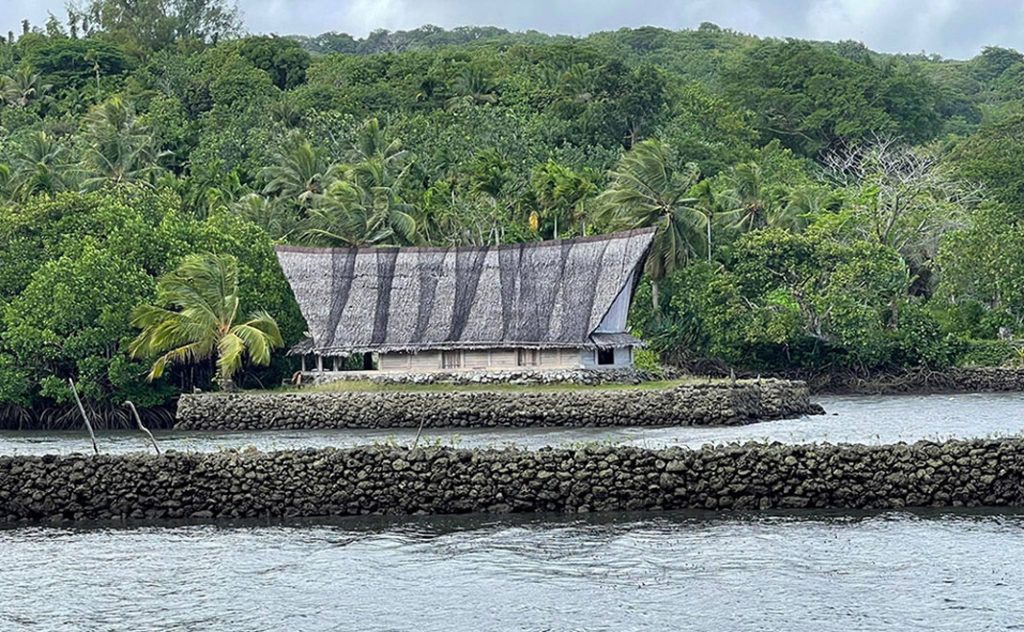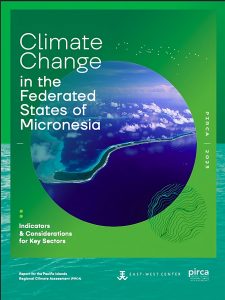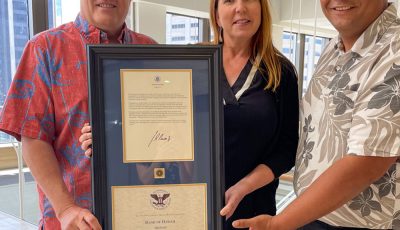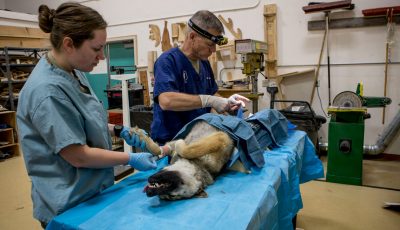Report: FSM faces health threats, stronger storms from climate change

In Yap State, stonework construction methods were used as an adaptive response to historical sea level variability, for example in this oceanside faluw, or traditional men’s house. However, sea level rise is now challenging this traditional strategy. (CLM PHOTOGRAPHY)
HONOLULU—Stronger typhoons, growing challenges for populations on low-lying atolls, ecosystem declines, and human health issues are among the major risks detailed in a new report on climate change in the Federated States of Micronesia.
Threatened resources include culturally significant coastal infrastructure and the tens of millions of dollars that fisheries inject into the FSM economy annually, according to the report by the Pacific Islands Regional Climate Assessment, or PIRCA, a consortium of several government, non-government organizations, and research entities.
The new report, Climate Change in the Federated States of Micronesia: Indicators and Considerations for Key Sectors, is one in a series of PIRCA reports. Authors from the East-West Center, Arizona State University, and the University of Hawaiʻi—along with 30 technical contributors from local government, NGOs, and research organizations—collaboratively developed the FSM PIRCA report.
“This research is important to translate science and reality into pragmatic solutions to address climate change,” said Lucille Apis-Overhoff, FSM’s assistant secretary of Climate Change and a contributor to the report.

The new report, Climate Change in the Federated States of Micronesia: Indicators and Considerations for Key Sectors. (CONTRIBUTED PHOTO)
Another contributor, College of Micronesia–FSM research scientist Dr. Murukesan Krishnapillai, has studied climate-related changes affecting the country’s communities and developed technical assistance programs that strengthen resilience of local food systems. “By delving into crucial aspects such as rising temperatures, extreme events, sea level rise, migration, human health risks, and food security, this report unveils the intricate web of challenges posed by climate variability and change,” Krishnapillai said. “Its analysis equips decision-makers with the insights necessary to develop effective action plans, ensuring a more resilient and sustainable future for the Federated States of Micronesia.”
Key messages
Climate Change in the Federated States of Micronesia lays out the changes the country is already experiencing, and what lies ahead. The key messages for decision-makers include:
- Hotter days and nights and stronger typhoons affect human health. Temperatures have risen, and heat waves exacerbate a range of pre-existing health issues. More intense tropical cyclones mean a greater potential for loss of life, damage, and public health issues. Hot weather and storms pose a particular threat to women, children, and older adults.
- Sea level rise threatens infrastructure, including housing, drinking water, and transportation, as well as agroforestry, ecosystems, and cultural sites. More frequent and extensive coastal flooding and erosion are anticipated as sea level rise accelerates. The FSM’s numerous low-lying atolls especially face growing challenges.
- Ocean changes disrupt fisheries and cause coral death.In the FSM, the ocean is life—more than 70 percent of FSM households engage in fishing. Fisheries changes and extensive coral loss are possible within the next few decades if current trends in rising ocean temperatures continue.
- Collaborations can bolster traditional knowledge and cultural resources and enhance resilience. National government, state agencies, non-governmental organizations, local communities, and others can work together to expand adaptation strategies.
About climate change in the Federated States of Micronesia and the PIRCA
The collective efforts of the technical contributors, coordinating authors, and PIRCA Advisory Committee made the FSM PIRCA report possible. The report builds upon the US National Climate Assessment, offering a closer look at climate change impacts in the FSM and providing information for a wide range of sectors.
The PIRCA is funded and supported by the U.S. National Oceanic and Atmospheric Administration’s CAP/RISA Program (through the Pacific RISA), the East-West Center’s Research Program, Arizona State University’s Global Institute of Sustainability and Innovation, the Pacific Islands Climate Adaptation Science Center, and the US Global Change Research Program. (PR)



























